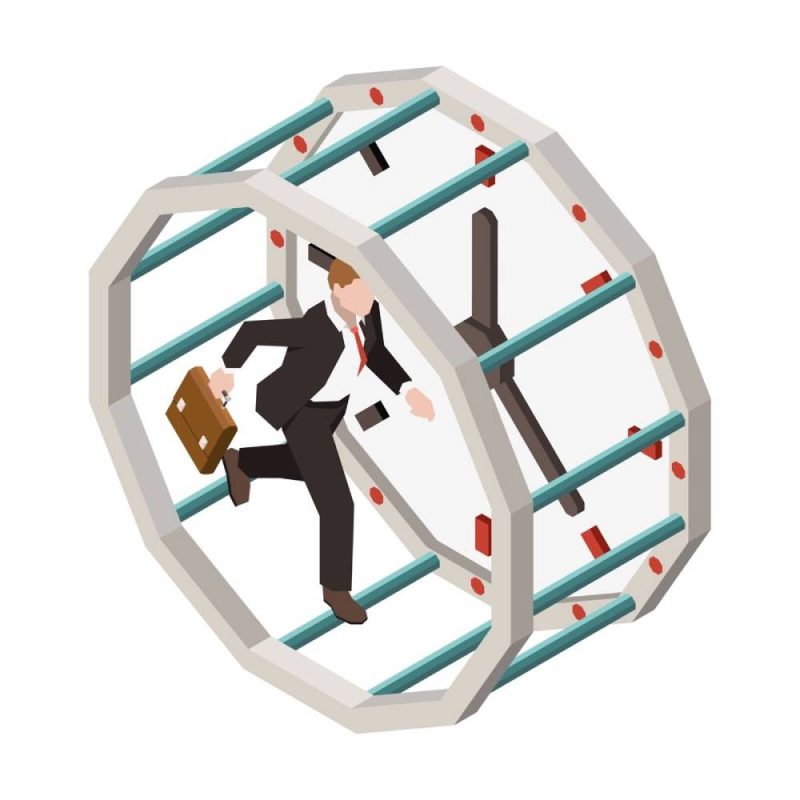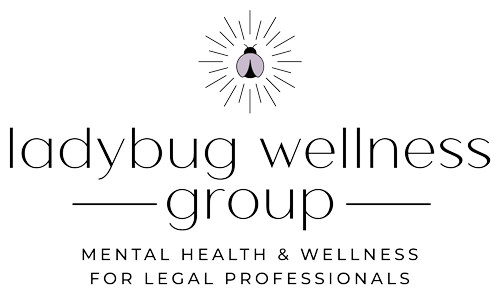“Perfectionism doesn’t make you feel perfect. It makes you feel inadequate.”
— Maria Shriver
As lawyers, we are imperfect people in a field that demands perfection. The result is that many of us find ourselves trapped on a hamster wheel, running as fast as we can, in a futile quest to be perfect.
We’ve spent hours drafting, reworking, and redrafting a simple email to a client. Toiling over a near-flawless brief until 11:59 pm, making innumerable minute changes and improvements, before filing at precisely midnight. Staying up into the wee hours reading and rereading a document and then rereading it again, fearing that we may have missed something. Beating ourselves up after being chastised by a supervisor for a misplaced comma, hanging orphan, or split infinitive. And then, once the email is sent or the brief is filed, lying awake worrying that we may have made an error, second-guessing a word choice, questioning how our work product will be perceived by others, or spiraling down a rabbit hole of what ifs.
It is this mindset – the self-doubt, black or white thinking, and catastrophizing – that distinguishes the drive for excellence from the trap of perfectionism.
But how did our desire to succeed morph into an obsession with results? When did we set the bar so high that it became impossible to achieve? Why do we believe that anything short of perfection is failure? Before we can find our way off the wheel, we need to understand how got here.
As with most things in law, there is no single, clear-cut answer. Rather, a variety of factors contribute to a penchant for perfectionism. For lawyers, the origins of perfectionism most often lay in a series of three compounding experiences.
First, to a large extent, lawyers are a self-selecting club of over-achievers. Dating back to childhood, we set very high personal standards, often in an effort to gain control of some aspect of our lives or to earn acceptance, praise, or recognition from our parents or others. We have since been unwilling to settle for less. It is no surprise then, that we’ve chosen a profession that prides itself on accuracy, precision, and excellence. While we know on an intellectual level that nobody is perfect, it doesn’t stop us from striving for perfection.

Layer on law school, where our egos take a hit and our perfectionistic tendencies are solidified. Right out of the gate, we are conditioned to believe that we must be perfect to be a good lawyer. We are terrorized by the Socratic Method, which either demonstrates our mastery of a legal concept and earns us the respect of our classmates or reveals our ignorance and leaves us feeling exposed and ashamed before a room full of our competition. Likewise, from grading curves, to the Law Review “write on,” to Early Interview Week invitations, the worthy are continually distinguished from the unworthy.
Finally, the practice of law itself has taught us that perfection begets success. Our work product is expected to be flawless. We are praised for billing the most hours. We earn assignments on desirable cases only if we are among those recognized as the top associates. If we don’t succeed in a client pitch, win an argument, or get a favorable verdict, we have lost. And partnership is reserved only for the best of the best. If we don’t make it, we have failed.
The trifecta of our early experiences, the pressures of law school, and the culture of the legal field, leaves many of us chasing the elusive ideal of perfection. But at what cost?
For starters, the stress, pressure, disappointment, and exhaustion of the chase often result, not in the perfection we seek, but rather in burnout and impaired work performance. Perfectionists are more likely to procrastinate, waiting for the perfect time to start, or putting off an assignment for fear of failing. Those plagued by toxic perfectionism also tend to be less flexible, open-minded, willing to take risks, and able to think outside the box. They are less collaborative and willing to delegate or ask for help, and less productive and efficient, as a result of over-thinking, second-guessing, and spending excessive amounts of time on one email, memo, or project. Ironically, some of the very same things that make lawyers successful – high standards and attention to detail – also undermine their continued success.
Beyond career implications, perfectionism has detrimental effects on both physical and mental health. The quest for perfection, for example, is associated with high blood pressure, decreased immune response, and exacerbation of existing medical conditions. Moreover, a fixation on perfection chips away at self-esteem and self-worth, infects personal relationships, and limits the ability to experience joy and gratitude. The impact on mental health and emotional well-being, though, can be even more dangerous and troubling. Indeed, studies show that perfectionism leads to increased rates of anxiety, depression, substance abuse, eating disorders, and even self-harm and suicidal ideation.

But the good news is that there is a way back.
The first step is awareness. Often, attorneys don’t realize that they’re struggling with maladaptive perfectionism and don’t appreciate how it manifests in and impacts their lives. It is critical to step back, assess your thoughts and assumptions, and contemplate whether any of this resonates with you. Then consider the following techniques to counter an unhealthy drive for perfection:
- Challenge your fears with concrete facts. What is the worst-case scenario? Most likely, making a Bluebook error, circulating the wrong version of a document, losing a motion, or even losing a client, will not set back your career. Nor does it equate with personal or professional failure.
- Allow (or, if necessary, force) yourself to make mistakes. Burn something you’re cooking, send an email with a typo, show up a few minutes late… and notice that everything is still ok.
- Try something new – a language, an instrument, a sport, a recipe – and embrace the experience of not doing it perfectly.
- Replace negative self-talk with positive affirmations. You can do this. You’re good at what you do. There’s a reason you were hired for this job, assigned to this case, or trusted with this deposition.
- Set SMART goals (i.e., goals that are Specific, Measurable, Achievable, Relevant, and Time-Bound). Focus on what you can do and set realistic expectations for yourself. Failure to accomplish an unrealistic goal or meet an unattainable standard is likely to perpetuate the cycle of perfectionism, whereas small, incremental goals tend to set you up for success and thereby boost self-esteem and confidence. (For further discussion on SMART goals, see my July 2023 post, Goldilocks and the Three Goals).
- “Don’t let perfect be the enemy of good.” Sometimes good enough is, well, good enough. Remember that you can be a great lawyer without being the best. Try to be proud of a job well-done even if it has a typo, isn’t an A, or doesn’t win.
- Focus on the things that make you feel good about yourself. Did you cook a great meal, complete a 5k, help a friend, or do a kind thing for a stranger? The more you focus on your strengths and celebrate small achievements, the easier it will be to separate your self-worth from achievement of the high (and perhaps unattainable) professional standards you’ve set for yourself and the resulting praise and external validation that you may or may not receive.
- Communicate to partners, supervisors, and clients what you realistically can deliver. You don’t have to do it all, or take it all on yourself, to be a good lawyer.
- Practice self-compassion. Acknowledge difficult or negative feelings about a tense interaction with a client or critical feedback from a supervisor and give yourself the time to sit with them.
- Let people in. Rather than withdrawing to protect yourself against criticism or negative feedback, or pushing others away because you prefer to do things your way, choose to talk to someone you trust, someone who can help keep your self-doubt in check, work through issues or difficult feelings with you, and provide support and reassurance.
- Seek support from a therapist or coach. Resolving to break the cycle of perfectionism on your own may actually serve to perpetuate those tendencies. In other words, an unsuccessful effort to “fix” your perfectionism may lead to a further self-criticism and erosion of self-worth.
As lawyers, we run ourselves ragged trying to create the perfect law school outline, deliver a flawless argument, or become the top lawyer in the field. But the pursuit of excellence necessarily involves setbacks, mistakes, and plan B’s. We’ve all made errors, missed the mark, gotten a bad review, or failed to achieve what we set out to do. It is through these hiccups and hurdles – these imperfections – that we develop resilience, flexibility, strength, and perspective, and, in turn, become healthier, happier, and more successful lawyers. So cut yourself some slack, focus on your strengths, embrace good enough, and commit to freeing yourself from the shackles of perfectionism.
YOU DON’T HAVE TO GO IT ALONE.









